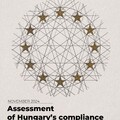In 2024 K-Monitor was working following its renewed strategy to make it harder to divert public funds in Hungary, to ensure citizens could stay informed about the decisions of those in power, participate in these decisions, and to promote the ideals of democratic governance, especially at the municipal level.

The political upheaval sparked by the pardoning scandal was compounded by worsening economic indicators. The euro exchange rate hit a two-year low, Hungary's EU presidency unfolded in a tense atmosphere, and significant EU funding was slipping away. Meanwhile, elections were held in both the EU and the United States, the Russian-Ukrainian war continued, and the Hungarian government extended its state-of-emergency governance, citing the ongoing conflict as justification. The rhetoric about sovereignty and economic neutrality grew even louder, yet the country purchased more Russian gas and turned to China for loans. On the bright side, Hungary has become a lender too! The government loaned €200 million to Chad—at a zero percent interest rate.
Not everyone had a tough year though. István Tiborcz, the prime minister’s son-in-law benefited from substantial tax breaks following his controversial heritage restoration projects, government close construction tycoon István Garancsi’s business interests made a fortune from building battery factories, and the prime minister’s childhood friend Lőrinc Mészáros managed to increase his wealth by 50%. The transfer of state assets into private foundations also continued, with the existing asset management foundations raking in tens of billions in dividends from shares of the national oil company MOL and the pharma company Richter that were gifted to them.
Following last year’s government backed acquisition of Vodafone by a crony company, the state’s purchase of the Budapest Airport brought yet another piece of strategic infrastructure closer to the government, costing billions of taxpayers’ money. Meanwhile, the maintenance of the railway infrastructure has become more critical than ever, with tracks and locomotives apparently holding strategic importance only for the general public attempting to travel. It also emerged that Hungary could spend as much as 40 billion Euros on road construction under the motorway concession awarded to Lőrinc Mészáros. At the same time, by December, Viktor Orbán declared that the state would not be able to finance the renovation of train stations. Instead, the government plans to lease these areas to private developers for 99 years.
Citizens against corruption
In 2024 K-Monitor was working following its renewed strategy to make it harder to divert public funds in Hungary, to ensure citizens could stay informed about the decisions of those in power, participate in these decisions, and to promote the ideals of democratic governance, particularly at the municipal level. We continued our activities in the Anti-Corruption Working Group and in the monitoring committees of EU operational programs. Additionally, we focused on enforcing anti-corruption measures tied to the EU’s conditionality procedure and on making bureaucratic processes more transparent and comprehensible. We also worked hard to provide the public with crucial information: many revelations this year came to light through our data request FOI lawsuits and analyses. On the local level, we systematically pushed for greater transparency and civic engagement, supporting progressive and proactive local actors who are committed to making a difference.
By the Numbers: K-Monitor's Achievements in 2024:
- Nearly 500,000 visitors accessed our public funds and corruption database.
- Close to 100,000 users completed our Voksmonitor election calculator designed for the EU and Budapest mayoral elections.
- 60 freedom of information requests were submitted by our colleagues, and 8 new lawsuits were filed against state institutions refusing to disclose information of public interest.
- 23,000 citizens shared their opinions in various municipalities using our Partimap map-based survey platform, which was also adopted by the Budapest Transport Center (BKK).
- Over 400 media appearances showcased our cases and topics.
- As a result of our transparency audits, the level of transparency improved by 10% in the monitored municipalities.
We work on renewing local democracy
The government continues to tighten the constraints on municipalities year after year. The 2024 chapter of this trend could already be anticipated from a Ministry of Finance document spotted by K-Monitor at the end of 2023. The document revealed plans for the most severe budget cuts yet in financing municipal responsibilities.
This has been reinforced by the reform of the local business tax system, whereby part of the local business tax is channelled into district development funds and then put out to tender for local governments to apply for as a form of subsidy. The government justified the measure as a way to support development in poorer settlements against unnecessary spending by towns with high business tax incomes. However, it is expected to serve primarily as yet another tool to curtail the autonomy of opposition-led municipalities, giving the central government greater control over how much funding individual municipalities receive. At the same time, we see that some of the most exciting pilots in making governance more transparent, people-centered, and efficient are happening at the municipal level. It’s no surprise that these efforts often draw the ire of the central government. Municipalities - whether led by opposition figures or by Fidesz-affiliated mayors - working towards common local goals and policies that often diverge from the central government’s agenda are frequently met with approval from local residents, and they highlight the potential of decentralized governance.
K-Monitor places strong emphasis on strengthening local governance and supporting good municipal governance. The past few years have clearly demonstrated that in municipalities where leaders prioritize improving the quality of governance over mere power consolidation, meaningful progress can be achieved within a reasonable timeframe. This progress can be seen in various areas, including strengthening relationships with citizens, implementing innovative developments, improving transparency, or fostering a cultural shift within local administrations. These examples underscore the potential of municipalities to deliver real results when governance focuses on serving the community effectively. All this may contribute to the renewal of democracy throughout the country.
This focus was reflected in our 2024 activities, particularly around the June 9 municipal elections. Ahead of the elections, K-Monitor launched an Open Municipalities Initiative and continued our This Is the Minimum! program. Together with Átlátszó, we produced a podcast series on the topic and compiled key guidelines for ethical municipal campaigning. In the second half of the year, we shifted our focus to tools that strengthen local democracy. We upgraded our Partimap and Transparent Budget applications, collaborated with other civil organizations to enhance budget transparency, held training sessions, and organized a conference in late November on local democracy. The conference addressed critical issues, marking the start of the new municipal cycle and providing a platform for meaningful discussions about the future of governance at the local level.
This is the Minimum!
This Is the Minimum! program, initiated in collaboration with Átlátszó and Transparency International Hungary, has been a starting point for enhancing transparency in many municipalities since 2019. Several participants in the program, including representatives who later became mayors, have used it to improve local governance. Our spring survey on municipal transparency revealed that transparency improved more significantly in municipalities that joined the program. However, it also showed that even among these participants, there is still considerable room for improvement. The This Is the Minimum! framework remains available for candidates and transparency-focused civil organizations as a tool to guide improvements in municipal data publication practices. As with any program, This Is the Minimum! requires periodic review and updates. In 2024, we began the process of refreshing its methodology to ensure it remains relevant and effective in addressing current challenges and needs.
Significant progress has also been made in the area of participatory governance by more committed municipalities, many of which have adopted innovative solutions over the past few years—often drawing on K-Monitor’s resources and expertise. Participatory budgeting has become widely practiced, alongside other popular tools such as citizen assemblies. Despite these advances, a widespread democratic breakthrough at the local level has yet to occur. Successful initiatives remain more like isolated islands of progress, and in some cases, such projects have faced delays or cancellations, with financial constraints often cited as the reason. Looking ahead, a critical task will be to refine these tools further and establish the channels and forums necessary for their continued expansion—even in the face of economic challenges. This will be essential to ensure that these democratic innovations become more widespread and sustainable.
Transparency performance of Hungarian local governments
It seems that the This Is the Minimum! project has had a tangible impact not only in shaping municipal attitudes but also in influencing the expectations of civil society. This year, with the help of Civil Kollégium Alapítvány (Civil College Foundation, CKA) and K-Monitor’s contribution, civil groups from 13 municipalities in Pest County came together to form the CKA Pest County Regional Civil Network, calling for greater transparency from their local governments. By early summer, six out of the 13 municipalities had implemented some degree of change. Moreover, it has had a transformative effect on local communities, empowering them to demand—and even enforce—more transparent practices from their municipalities.
Open Municipalities
Beyond the This Is the Minimum! program, K-Monitor launched a new initiative in 2024 called Open Municipalities, inviting mayoral candidates to make concrete, locally relevant, and measurable commitments on how they would make their municipalities more transparent, accountable, and open to citizen participation. In March, K-Monitor organized a workshop with experts from the Open Government Partnership (OGP) for municipal decision-makers, focusing on the principles and potential initiatives of open governance. Additionally, we published a guide outlining key principles and best practices for fostering open governance at the local level. So far, 40 mayoral candidates have made commitments under this program, 7 of whom successfully won their elections. One notable example is Tamás Soproni, the mayor of Terézváros (Budapest District VI), who fulfilled his pledge by organizing a quasi-referendum on short-term rentals. In this process, residents were consulted directly, leading to a decision to ban Airbnb and similar short-term rental practices in the district. This is a strong example of participatory governance and transparency in action.
Our efforts are related to the fact that the Budapest General Assembly discussed the issue of municipal transparency during its very first session. A public consultation was launched to improve transparency in the capital, and a resolution was adopted to implement several reforms that K-Monitor has long advocated for. In 2025, K-Monitor will work to ensure that these reforms are truly implemented.
As part of our work on municipal governance, we also produced a 4-part podcast series in collaboration with Átlátszó. In these episodes, we explored topics related to transparency and participation with invited guests, including municipal officials, governance experts, civil society representatives, and mayors. This series provided a platform to discuss challenges and share best practices for fostering open governance at the local level.
Local democracy
Our Monitoring Together project supported by CERV has come to an end. The project’s backbone were local level collaborations focused on local participation and transparency, implemented using one of K-Monitor's digital tools with the aim to improve civil society work through data driven tools and strategic communication.
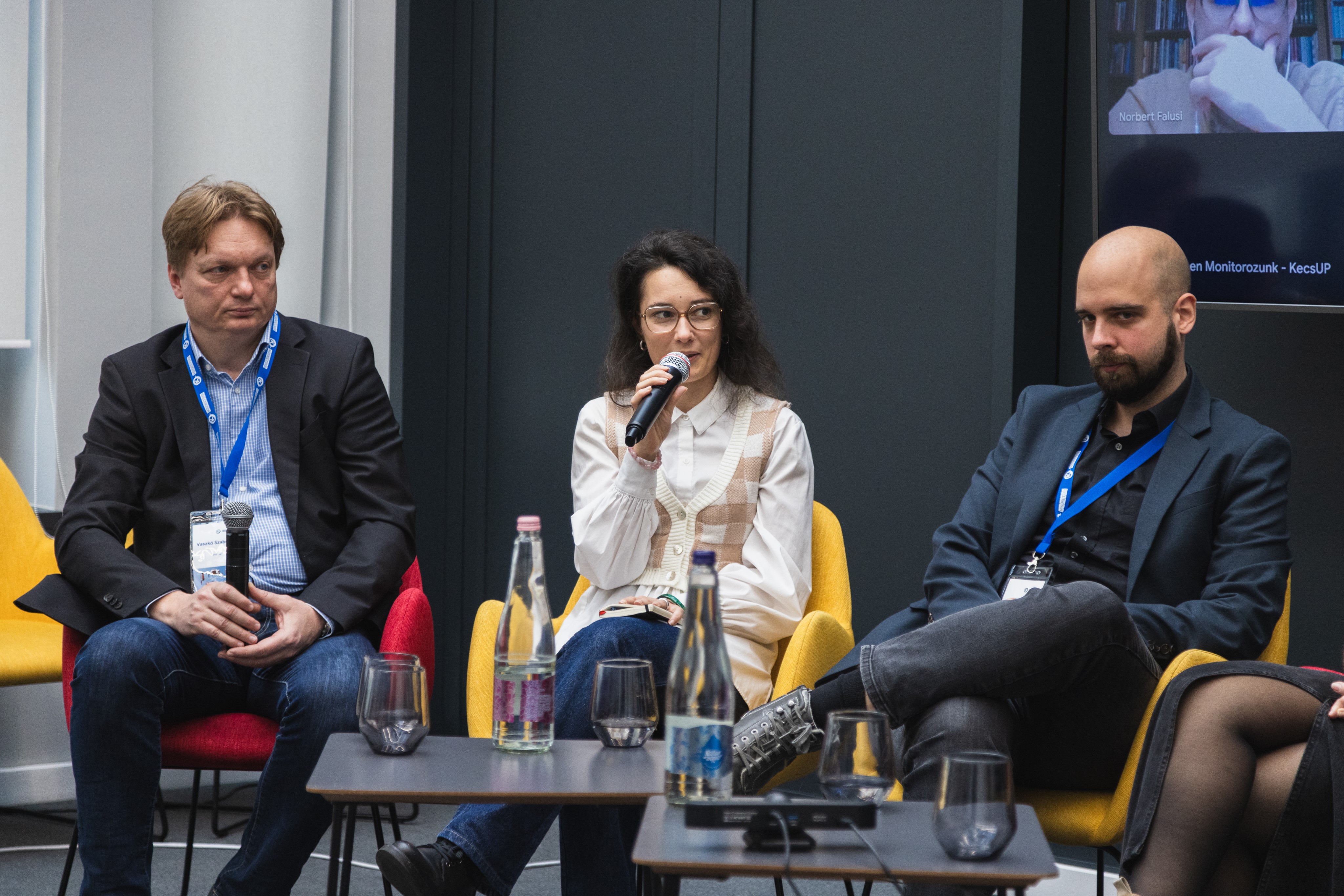 Our project partners' discussion at K-Monitor's conference on local democracy
Our project partners' discussion at K-Monitor's conference on local democracy
- Kecskemét: Together with the news portal Kecsup.hu, we created a Transparent Budget, presenting the city's budget through infographics. Additionally, we processed and mapped data on EU-funded developments in Kecskemét, focusing particularly on road infrastructure projects. Our shared goal was to ensure that residents could access clear and sufficient information about important yet complex local issues.
- Veresegyház: In partnership with the Tavirózsa Association, we first organized a suburban transportation forum. The association believed the city's transportation concept was overly car-centric, and as a result of their efforts, additional pedestrian- and bicycle-friendly elements were incorporated. For our second collaboration, we used our Partimap application to identify small-scale development needs in areas such as Fenyves, Pamut-tó, and the Álomhegyi Reservoir.
- Gárdony: For the Alba Natura Civil Foundation, we created a Partimap questionnaire. Their project aimed to represent local residents’ needs for smaller developments, with a particular focus on green spaces, in their advocacy with the municipal government.
- Debrecen: In partnership with the Association of Alternative Communities (AKE), we developed Voksmonitor, which helped voters navigate important local issues ahead of the municipal elections. We also worked on the "Market Street (Piac utca) Reloaded", mapping development opportunities for one of Debrecen’s main streets using our Partimap tool.
Additionally, K-Monitor was able to further develop its digital tools based on the real needs of its partners. According to feedback, the most significant outcome of the project was the successful combination of offline and online engagement, which allowed participants to build new connections with local residents, expand their volunteer and supporter base, and foster a stronger local democratic environment. This included promoting a culture of constructive debate and nurturing grassroots demand for greater participation in local governance.
To connect and summarize the above activities, we organized a two-day conference at the end of November titled Local Democracy in Practice. The event brought together municipal leaders, civil groups, and both domestic and international experts to discuss the details of building open, transparent, and participatory local governments. Participants included Mayor Gergely Karácsony, representatives of the parties active in the capital, the mayors of Érd, Terézváros, and Zugló, as well as representatives of the mentioned Hungarian CSOs. We also welcomed partners from Poland, Lithuania, the Czech Republic, Slovakia, Romania, Bulgaria, Serbia, and Slovenia.
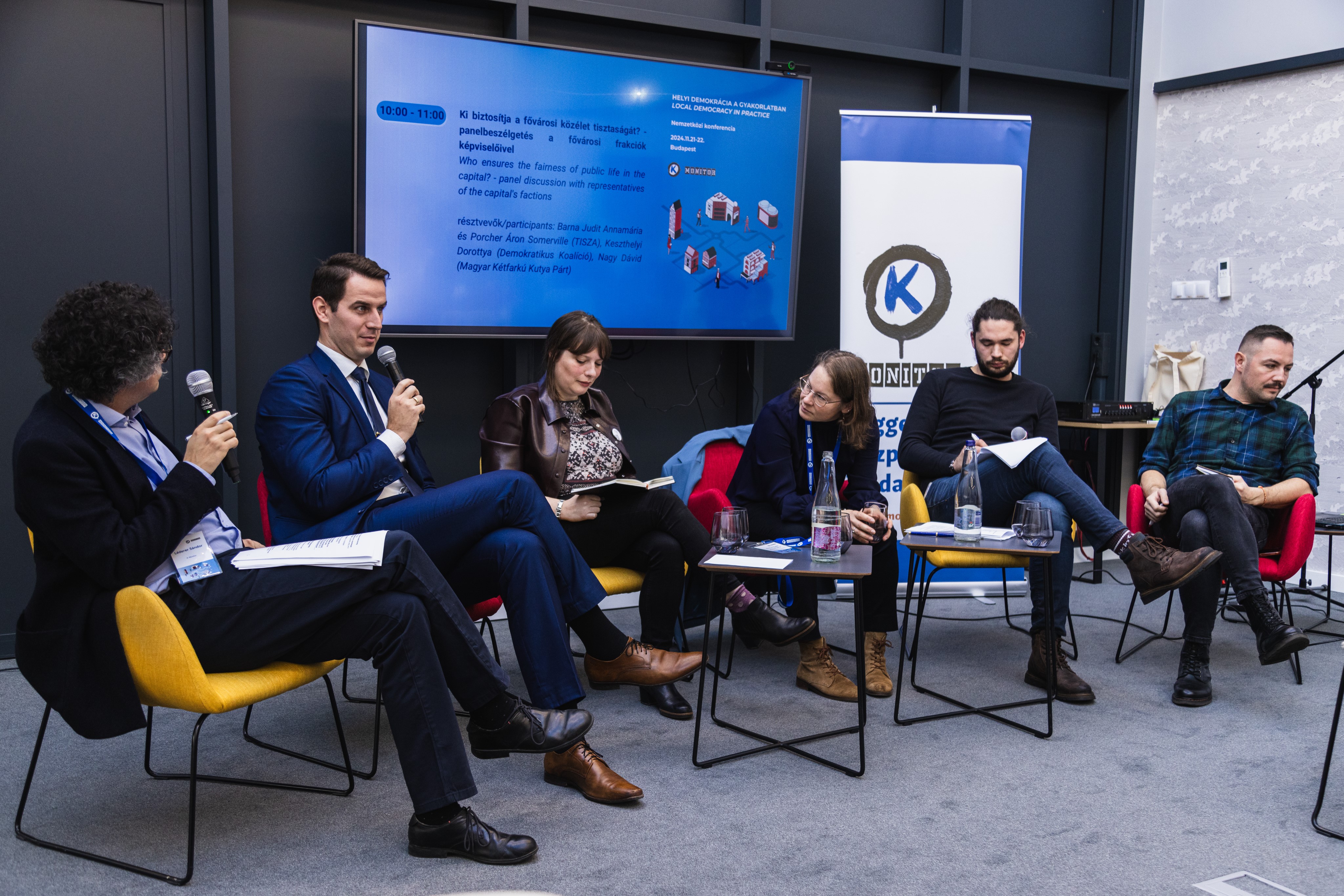
Representatives of the political groups in the Budapest city council
Municipal elections - campaign ethics
A long-standing issue at both national and municipal levels is the widespread use of public office resources for campaign purposes. Since no significant legal changes are expected in this area, we felt it was important to at least articulate the standards that every candidate committed to ethical governance should uphold. To this end, we developed a set of guidelines for conducting lawful and fair campaigns, highlighted some bad practices, monitored questionable activities, and created a survey allowing stakeholders to share their views on cases that fall into the "gray zone". Our goal was to spark a discussion about what constitutes ethical campaigning. Such a debate could eventually pave the way for future regulations that ensure fairer electoral practices.
Anti-corruption work in 2024
As an anti-corruption initiatve, we had plenty to do this year: tracking the flow of public funds, exposing abuses, helping to ensure access to information in an increasingly restricted public sphere, and offering alternatives to the exclusionary and authoritarian practices of governance, both at the national and local levels.
Anti-Corruption Working Group
K-Monitor remained a member of the Anti-Corruption Working Group operating alongside the Integrity Authority, as we believe in seizing every opportunity to improve the framework for combating corruption. Our participation is guided by a constructive yet critical perspective. This year, as in previous years, along with representatives from Átlátszó and Transparency International Hungary, K-Monitor did not voted for the adoption of the annual report of the Anti-Corruption Working Group. In our view, the report failed to provide an accurate depiction of Hungary’s corruption problems and lacks sufficiently ambitious commitments. We criticized the report for its failure to confront Hungary’s corruption issues head-on. Notably, it omitted several critical risk areas, such as party financing, campaign spending, asset declarations, and the situation of whistleblowers. We also raised concerns about significant anti-corruption legislation, such as the whistleblower protection law, being passed without proper consultation. Together with Transparency International Hungary, we prepared an alternative report, joined by five other civil members of the Working Group. This report addresses the issues and omissions left out of the Working Group's 2023 annual report.
Rule of Law Report
In addition to monitoring the EU’s conditionality mechanism, we also followed other EU processes. Together with our partners, we participated in the public consultation for the EU Rule of Law Report as part of the EU’s open societal dialogue process. The joint civil society submission provided a detailed analysis of Hungary’s ongoing failure to ensure judicial independence, institutional capacity in combating corruption, and the inadequacy of sanctions. The European Commission’s report, published at the end of July, reached the following conclusions: no progress has been made on adopting comprehensive reforms for lobbying activities and the revolving door phenomenon. Furthermore, the system for asset declarations has not been further strengthened to ensure effective oversight and enforcement. Hungary has also failed to achieve significant results in investigating, prosecuting, and securing final convictions in cases of high-level corruption. Overall, the Commission’s findings in the chapter on corruption largely align with our observations and experiences.
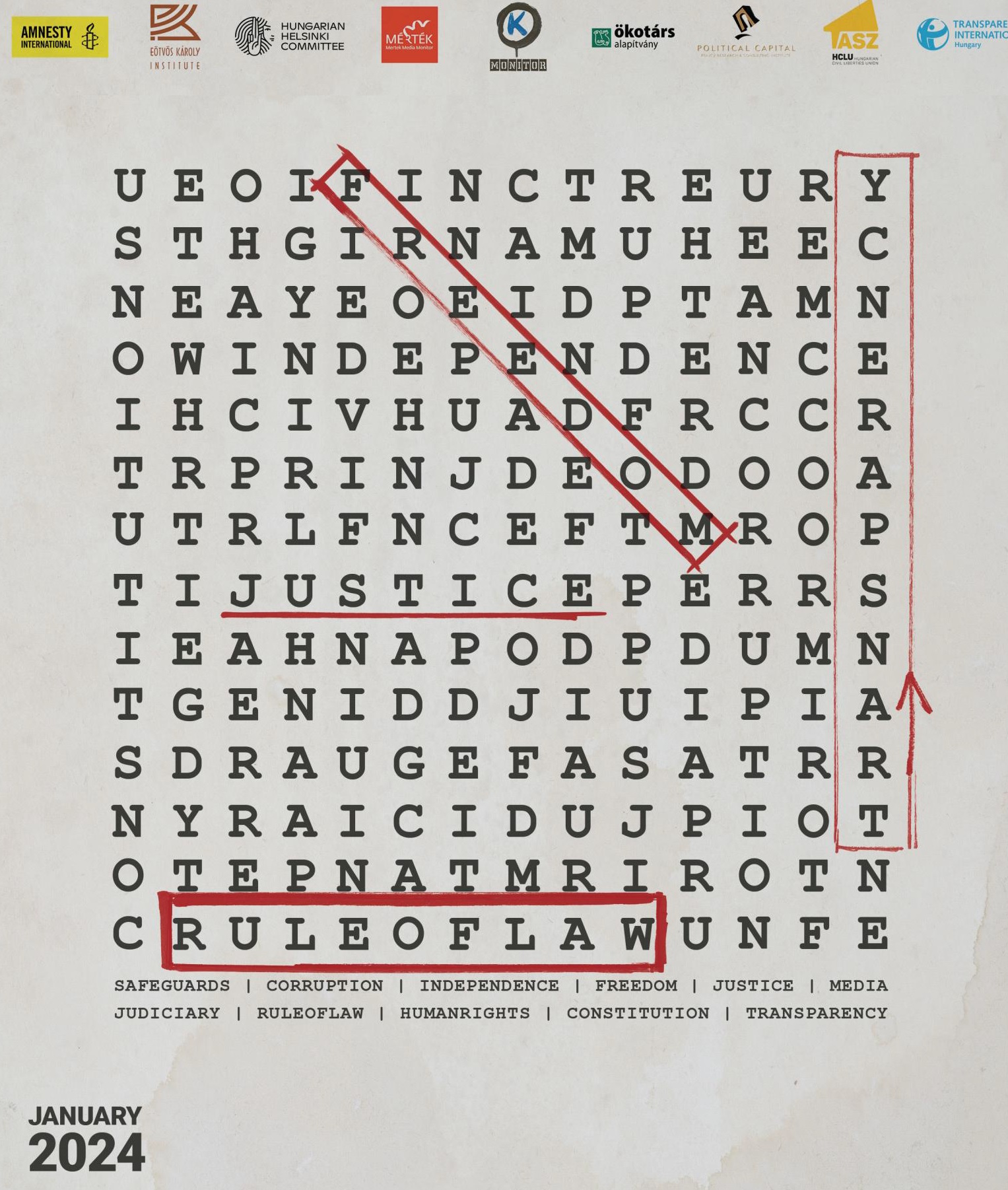
Monitoring Committee Affairs
K-Monitor became a civil society member in two Monitoring Committees that serve to monitor the progress of operational programs funded by EU cohesion funds. In the TOP Plusz Monitoring Committee, 2023 was largely focused on reviewing the evaluation criteria (selection criteria) of calls that had already been announced. In contrast, 2024 was more centered on implementation. Over 50% of the regional funding allocations have already been “committed,” meaning decisions on grants have been made. However, in the case of Budapest, only three calls have been opened so far, and no projects have yet reached the stage of having signed grant agreements. We requested that in the future, whenever the institutional system proposes amendments to the regional programs, Monitoring Committee members should be informed. We also requested detailed information on the reporting obligations for beneficiaries in implemented projects and the monitoring of the maintenance phase. We are still awaiting the outcomes of these inquiries. This year saw the first program amendment under TOP Plusz, resulting in a minimal budget reallocation of about 1.5%. However, it helped set the stage for the mid-term revision that the Hungarian government must submit to the European Commission by March 31, 2025. The most significant development was gaining insight into the system of funding decisions for territorial development projects. In this system, the ministry (managing authority) and counties jointly decide which applications receive funding through so-called decision-preparation committees. While this stage of decision-making is largely formal, it opened a previously opaque "black box," making it somewhat harder for political preferences to override professional considerations at this point in the process. This level of transparency in decision-making also enables us to identify risk factors in grant applications. This allows us to provide recommendations to the institutional system to filter out potentially problematic applications—a task we will continue to focus on next year.
We continued our collaboration and knowledge-sharing with other civil participants in the monitoring committees of various operational programs. Together, we identified a shared priority: to examine more closely the flagship projects that consume the majority of EU funds but currently fall under the minimal oversight and influence of the monitoring committees.
Legal matters
This year, we initiated 8 new FOI lawsuits to obtain public interest data. 3 out of these cases were won, and 2 others were won at the first-instance level but were still pending appeal at the end of 2024. A key strategic step this year was expanding our efforts beyond our own cases to help civil and journalist partners in accessing public interest information. We supported Balázs Romhányi, director of the Fiscal Responsibility Institute Budapest, in obtaining pension disbursement data from the Hungarian State Treasury for his research. We also provided legal representation to the newspapers Népszava and Magyar Hang, helping them access to information that the state was attempting to withhold.
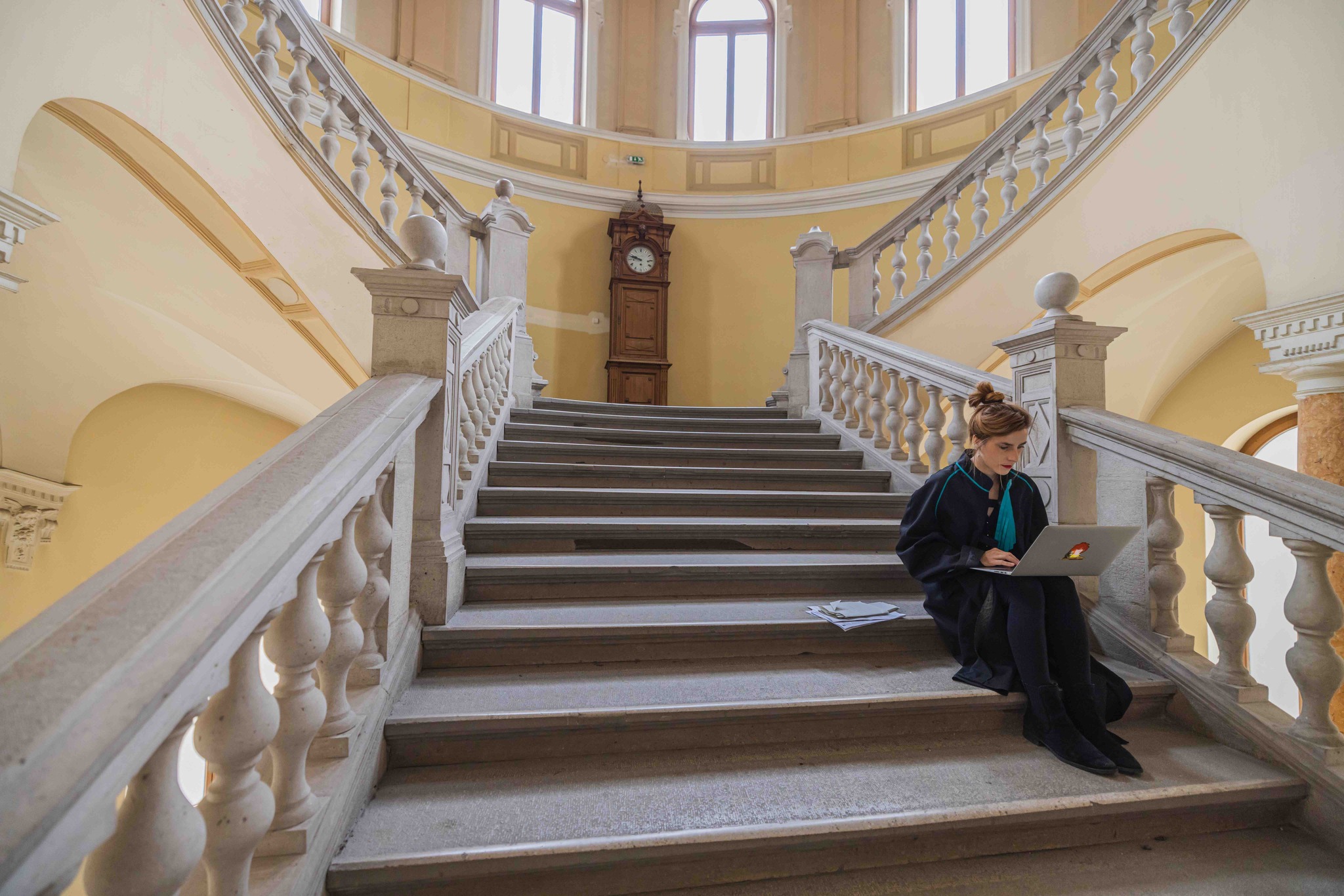 K-Monitor's lawyer Noémi Fanni Molnár
K-Monitor's lawyer Noémi Fanni Molnár
The Government and healthcare institutions communicate on a daily basis what action they are taking to address problems in the health sector. Yet, waiting lists continue to grow, funding shortages remain severe and the private sector is expanding with the lack of transparency. We might better understand the processes if the confidential study that serves as the basis for the healthcare reform, commissioned by the government and prepared by the Boston Consulting Group (BCG), were made public. Not to mention, professional debates could also take place regarding the planned measures. Since 2021, K-Monitor has been fighting to uncover the contents of the BCG document, but so far, without success. Although we won our case against the Ministry of Interior in 2024 at the appellate level, the Kuria (highest court of Hungary) overturned the decision. As a next step, K-Monitor turned to the Constitutional Court. In a separate lawsuit, we also sued BCG, the authors of the study, and after exhausting domestic legal avenues, we took the case to Strasbourg. This was necessary because the government has still not implemented the Constitutional Court’s 2020 ruling, which requires ensuring the ability to sue companies receiving public funds to compel them to provide information. In the absence of such a remedy, companies can simply ignore their obligations without facing any consequences. This sends a less-than-ideal message, especially coming from a global consulting firm. However, it seems that maintaining a good relationship with the government was more important to BCG than transparency.
Exciting developments have occurred in the nearly three-year-long legal battle over the summary of one of the Bajnai government’s cabinet meetings and its annexes. Despite a final court ruling, we have yet to receive all the requested documents from the Prime Minister’s Office. After the enforcement process began as expected, we were unexpectedly served with a lawsuit by the court in the spring of 2024: the Prime Minister’s Office filed a lawsuit against K-Monitor seeking to terminate the enforcement. The Ministry was so insisting that the annexes required by law did not exist that it sued us to stop the enforcement. This is how we became defendants in our own case, and thus we were forced to defend ourselves in a case that we had originally filed. Finally, the Government's arguments were not accepted in the enforcement lawsuit either: we won the lawsuit again at first and then at second instance in October 2024. Thus, nearly three years after the initial request for information was filed, the enforcement procedure for the annexes to the cabinet meetings will continue.
We have also worked hard to make sure that more people have access to data of public interest. Over the past year, we held two webinars for citizens and journalists on the intricacies of filing information requests, as well as organized a workshop for lawyers who represent civil society organizations and media outlets in freedom of information (FOI) cases. We regularly shared our experiences and tips on our blog, and we also launched a new website dedicated to guiding citizens on how to access public interest information generated in the course of state operations.
Even more cases
In more than sixty blog posts, we reported on legislative amendments, assessed the performance of various public institutions, pointed out misuse of public funds, and provided information on matters of public interest.
We assisted Fidesz representatives Sándor Fazekas and Erik Bánki in correcting errors in their asset declarations. Additionally, we provided a detailed analysis of how the government further undermined the asset declaration system while presenting these measures to the EU as reforms.
We showcased the most expensive state-sponsored events of 2023, all organized by companies linked to Gyula Balásy. As part of our ongoing scrutiny of wasteful public spending, we also updated our map tracking failed EU-funded projects.
 Antal Rogán and Gyula Balásy, key persons behind governent propaganda in Hungary
Antal Rogán and Gyula Balásy, key persons behind governent propaganda in Hungary
We requested Corvinus Investment Zrt., the state-owned company facilitating large-scale acquisitions and sales with government involvement, to publish a list of transactions exceeding EUR 1.25 million. Corvinus initially rejected our information request, claiming that the data constituted trade secrets and was not available in the requested format. In response, K-Monitor filed a lawsuit against Corvinus Zrt. Following the first court hearing, Corvinus Investment Zrt. released the transaction data requested by K-Monitor in April, or at least part of it.
As a striking example of "sovereignty protection," the Hungarian government previously classified the loan agreement for the Budapest-Belgrade railway construction at China's request. Now, the concealment of this questionable-return investment from the Hungarian public has taken an even more absurd turn. We revealed that MÁV (Hungarian State Railways) is attempting to withhold a contract with a Józsefváros-based Fidesz-affiliated law firm working on land expropriations for the project, citing a regulation that limits transparency. In response, K-Monitor filed a complaint with the National Authority for Data Protection and Freedom of Information (NAIH), requesting an investigation into the matter and urging the authority to compel MÁV to rectify the violation. After the NAIH proceedings, we took further legal action, initiating a lawsuit to address this issue.
There is no comprehensive information available on who advises the government and for how much, thus in 2023 K-Monitor requested data from all ministries to answer these questions. The ministries initially pretended not to understand the information request and later outright refused to disclose the list of advisors. In response, K-Monitor turned to the National Authority for Data Protection and Freedom of Information (NAIH), which confirmed that the list of political advisors should indeed be made public. Relying on NAIH’s opinion, we filed a lawsuit in this case as well to ensure transparency in government advisory spending.
We evaluated the 2024-2025 Anti-Corruption Strategy, which was developed by the government under EU pressure, and highlighted a critical omission: the government quietly removed measures aimed at improving the transparency of private equity funds from the strategy.
Following the presidential pardon scandal, K-Monitor filed a public interest information request with the Ministry of Justice, seeking data on the types of clemency petitions the justice minister has countersigned since 2013. The ministry rejected our request, demonstrating its unwillingness to promote transparency in this area, even at the level of statistical data. In another significant matter, we faced a similar lack of cooperation from the State Audit Office (ÁSZ): As pointed out by Atlatszo.hu, a legal loophole allows public funds to flow freely to civil organizations that either run in elections or collaborate with and support government-affiliated politicians. Given that the State Audit Office (ÁSZ) is the primary body responsible for monitoring the use of public funds, we filed a public interest report requesting that ÁSZ investigate the organizations financed by the Prime Minister’s Office. In its response, ÁSZ claimed that no illegality had occurred, and therefore, no further action was needed.
Two weeks ago, we highlighted that, due to a legislative amendment, the MOL-New Europe Foundation has been assigned a new public task: the maintenance and operation of buildings related to built heritage. This change also transfers ownership of the property complex in Felsőörs that houses the Snétberger Center to the foundation. In essence, this means that the upkeep of the estate will ultimately be partially funded by public money—drawn from the dividends of wasted public assets and the interest on government bonds.
We delved deeply into several key topics
Following the European Commission's launch of the so-called financial conditionality mechanism against Hungary and the European Council’s decision in December 2022 to suspend EU funds allocated to the country, the Hungarian government initiated numerous legislative amendments to address the EU’s rule of law concerns. Among the laws revised in response to these concerns was the Freedom of Information Act. The amendments were introduced gradually, coming into effect between October 2022 and March 2023. To assess the impact of these reforms, we conducted a comprehensive study on the evolution of freedom of information in Hungary since 2022.
After the government abruptly terminated public access to the beneficial ownership database at the beginning of 2024, we conducted an analysis to highlight the challenges faced by anyone attempting to investigate who is behind companies that receive billions in public funds.
Two years after the Hungarian government, under pressure from the European Commission, strengthened the institution of public consultation in October 2022, we analyzed how the practice of it has evolved in Hungary. Our findings show that while there appears to be progress, it is largely superficial. Draft legislation is often published at relatively late stages, by which point the government’s legislative machinery is already in full swing. Despite these limitations, it is evident that many organizations and citizens are eager to participate—or at least express their dissent through this channel. We are among those actively engaging in these consultations. For instance, we shared our opinions on amendments to the KEKVA law (regulating public interest asset management foundations) and legislative proposals affecting the Freedom of Information Act (Info Act).
Drafts open for public consultation on a monthly basis
We closely monitored the draft legislation made available for public consultation each month. Alongside this effort, we collaborated with the Prague-based CEELI Institute and our international partners on a regional freedom of information survey. Through this survey, we provided detailed insights into the opportunities and challenges faced by those seeking access to public interest information in Hungary.
Digital tools for renewing democracy
In 2024, we continued our efforts to make our free, public-interest, self-developed applications more user-friendly and efficient. With the help of our IT intern and Spreadmonitor Ltd., we enhanced K-Monitor's oldest tool, the popular news database on corruption cases and public funds spending. This tool now leverages artificial intelligence to search, categorize, and tag news articles that report on corruption and public spending. These improvements have significantly increased the efficiency and accuracy of collecting and organizing articles into the database. The press archive, which has been operational for over 15 years, had almost 500.000 visitors in 2024.
For the 2024 European Parliamentary elections, K-Monitor collected the policy views of the competing parties and, with the help of KohoVolit, created a new Voksmonitor questionnaire, which allowed users to compare their own policy views with the parties' positions. This year's EU Voksmonitor contained a total of 40 questions focusing on EU institutions, EU policies, the internal market, cohesion policy issues, and social affairs. By June 9, election day, more than 60,000 users had completed the application, and the results were analyzed by the Vox Populi election guide. Simultaneously, a Voksmonitor was also prepared for the mayor of Budapest election, with the interesting finding that the programs of the two remaining candidates were remarkably similar.
New filters and export functionality have been added to our website Parldata, which processes Hungarian parliamentary debates with the goal of making parliamentary records transparent and searchable. Thanks to these developments, users can now search debate texts using specific keywords (e.g., topics, laws) or narrow down results based on MPs, factions, types of debates (e.g., legislative proposals, pre-agenda speeches), and specific time intervals. The search results provide direct links to the full text or excerpts of individual debates.
 Discussing corruption has always been part of parliamentary debates since 1990
Discussing corruption has always been part of parliamentary debates since 1990
We also improved our application Figyusz, which monitors various state websites for fresh information on topics of interest to users. This year, the system was expanded to include court rulings. Additional content uploads are planned for next year.
We worked extensively on improving our Partimap application as well. Partimap is an interactive, map-based tool designed to facilitate community planning and participatory decision-making. The new features developed in 2024 include the ability to use conditional questions and expanded feedback options. Partimap was utilized by BKK for the bike lane survey on the Körút and was also employed for surveys in Pesterzsébet, Újpest, and Újbuda.
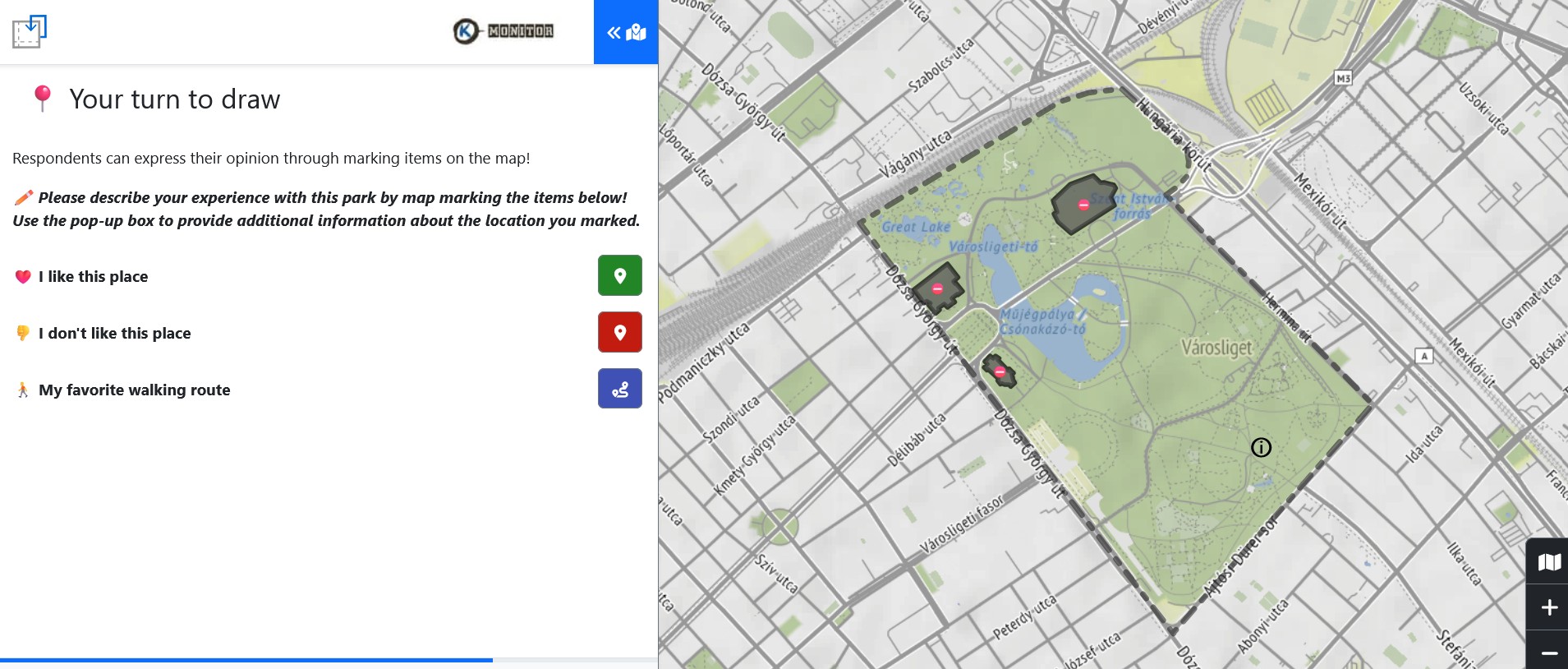
The City Park of Budapest in a Partimap survey
We made minor improvements to the Közérthető Költségvetés (Transparent Budget) app, which several municipalities updated to showcase their financial management to local residents. The most extensive information was shared by Terézváros and Józsefváros.
On the digital front, we collaborated with others as well. Together with the Periféria Center, we created and updated an interactive website showcasing the municipal rental housing sector. Based on data from 2016-2023, the site highlights issues such as the significant decline in the number of rental units and low maintenance expenditures.
We also supported the Housing Minimum campaign and the Emma Association's programs through data visualizations provided via the Periféria Center.
An update from K-Monitor
The activities mentioned above are supported by a tremendous amount of work and a dedicated community: this year, we worked with eight staff members, three interns, dozens of volunteers, hundreds of micro donors, and thousands of followers to build a more transparent and democratic Hungary. Our vision is a country where the flow of public funds is transparent and spent on essential priorities, such as developing community infrastructure, education, and healthcare. Additionally, we strive to empower citizens with a more direct say in how their tax money is spent and how local matters are shaped.
 Some of us
Some of us
In 2025, K-Monitor celebrates its 18th anniversary of establishment, and we believe that our mission is more relevant than ever. In 2025, we continue our advocacy work at the EU, national, and local levels, producing policy analyses and recommendations aimed at strengthening the institutional and legal frameworks for anti-corruption efforts and preserving and enforcing the remaining elements of the rule of law. We will also carry on with our legal advocacy activities, such as our freedom of information lawsuits, to enforce compliance with the law and assist other civil groups and journalists who lack similar capacities. In addition, we will further strengthen our activities that focus on local communities, aiming to contribute to a grassroots-driven democratic renewal in Hungary. We will support the creation and dissemination of best practices that promote citizen participation in local decision-making and foster the emergence and strengthening of good governance at the municipal level.
We believe that the knowledge, practices, and communities formed through this work can serve as the foundation for Hungary's democratic future. In line with these two main directions, we will continue to focus on both specific cases and broader, more comprehensive issues, ensuring that concealed state information is brought to light. Next year, we also plan to collaborate extensively with our civil society partners in the region—learning from them and sharing our experiences.
In 2025, we continue to expand our technological toolkit to process and present data and important information more effectively. At the same time, we remain mindful that major tech companies often wield as much influence over our lives as governments do. Therefore, their operations must also be made more transparent, and their power needs to be constrained within appropriate limits.
Our work this year was supported by numerous organizations, allowing us to operate with a budget of over EUR 300.000 in 2024. Our largest supporters were the Sigrid Rausing Trust and the National Endowment for Democracy, but we also received funding from the Prague-based CEELI Institute, the Dutch Embassy, and the EU CERV program. Additionally, we received approximately EUR 15.000 in donations and 1% tax contributions from individual supporters, for which we are very grateful.
If you like our work,
support K-Monitor!
Címkék: english
Szólj hozzá!
A bejegyzés trackback címe:
Kommentek:
A hozzászólások a vonatkozó jogszabályok értelmében felhasználói tartalomnak minősülnek, értük a szolgáltatás technikai üzemeltetője semmilyen felelősséget nem vállal, azokat nem ellenőrzi. Kifogás esetén forduljon a blog szerkesztőjéhez. Részletek a Felhasználási feltételekben és az adatvédelmi tájékoztatóban.





